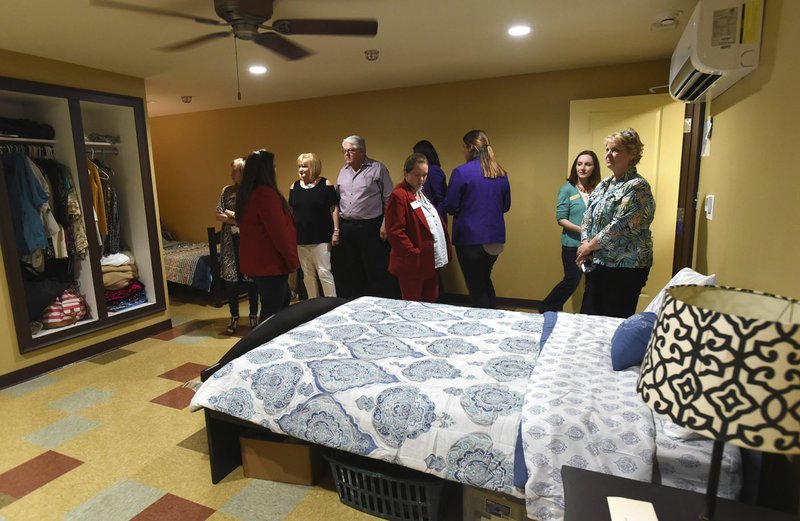SPRINGDALE -- Eva Terry knew years ago that the Peace at Home Family Shelter would need to expand.
On Wednesday, a second-floor expansion, which will allow the shelter to house about 20 more domestic violence victims and their children, was celebrated with a ribbon cutting.
Contacting the shelter
The Peace at Home Family Shelter can be contacted by calling its emergency hotline at (479) 442-9811. Trained staff members are available on the hotline 24 hours a day.
Source: Staff Report
Benton County’s Domestic Abuse Shelter
The Northwest Arkansas Women’s Shelter in Rogers has assisted domestic abuse victims since 1988. It has 17 family-size bedrooms for clients and their children. Victims who do not have children can stay in those rooms as well. The shelter can accommodate more than 40 people. Victims can stay at the shelter for up to 30 days. Male domestic abuse victims are also welcome. The shelter can be contacted by calling its hotline at 479-246-9999.
Source: Amber Lacewell, director of community outreach and education for the shelter
Ground was broken for the project last September. Construction was completed in June, said Terry, the shelter's development director.
A second floor was planned when the Springdale location was built in 2008. Terry said she and her colleagues saw there were more people in need of assistance than they were able to shelter.
"Our board started looking at the feasibility of expanding the shelter and raising the dollars to do so in 2012," she said. "In 2015, we actually launched our Growing for a Safer Tomorrow campaign, which funded this expansion."
The campaign raised about $850,000, with a $593,144 leadership gift from the Donald W. Reynolds Foundation. The remainder was raised from corporate and individual donors, Terry said.
"It would not be possible without the support of Northwest Arkansas. You're saving lives every day by investing what you can," said Teresa Mills, shelter CEO.
The 3,200-square-foot expansion includes four large family bedrooms, a second laundry room and two additional sitting areas. The shelter's bed count went from 31 to 50. Terry anticipates sheltering 100 more people each year.
"When we opened the expansion to clients in late June, we had all rooms filled within 24 hours," Terry said.
The shelter has housed an average of 40 people a day since the expansion opened. Single people share rooms, but moms with children are given their own room. There are 12 family rooms total, Terry said.
The shelter opened in a small house in Fayetteville in 1977, Terry said. The shelter has moved twice, first to another Fayetteville location and then to Springdale. The location is kept confidential to protect clients from abusers, she said.
Clients and their families can live at the shelter for up to 90 days.
"We provide everything meeting their physical needs -- room, clothing, food, transportation, advocates who work with each family on what they need to be independent," Terry said.
Such assistance includes finding long-term housing, child care and employment, Terry said. The shelter also has a legal services program as well as support groups, counseling and children's programs.
"Most of our clients originally reach out to us through our 24-hour emergency hotline," Terry said.
Clients are also referred to the shelter by police officers, school counselors, clergy, hospital and medical staff and family and friends. Some find the shelter on their own, Terry said.
Although shelter residents are mostly women, it does male domestic violence victims, Terry said.
The shelter's core service model is empowerment, she said.
"We know it's up to our individual clients to know what's best for themselves, and sometimes we do have clients who choose to go back into an abusive relationship, and we want to make sure they reach out to us in the future if they're ever wanting to try and leave again," Terry said.
The shelter has around 20 staff members, Terry said.
Sarah Kresol has worked as a shelter advocate for four months, helping clients set goals and achieve them. She said statistics show domestic abuse victims usually leave an abusive relationship seven times before breaking away for good.
"Either they're manipulated back into the situation by the abuser or they feel like they can't make it on their own or they want their family back together," Kresol said. "They really are hoping to get away."
NW News on 09/07/2017

